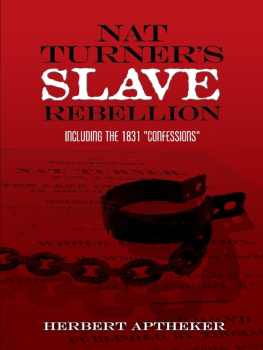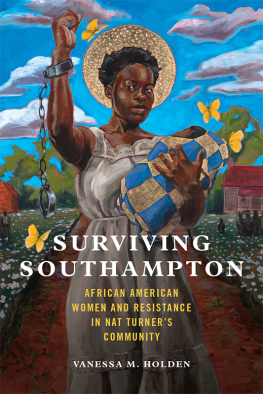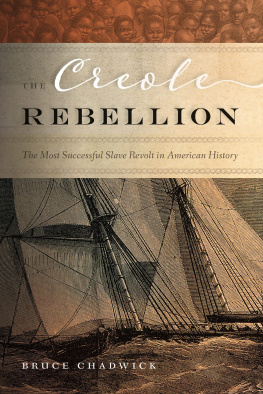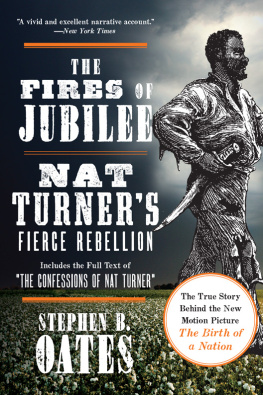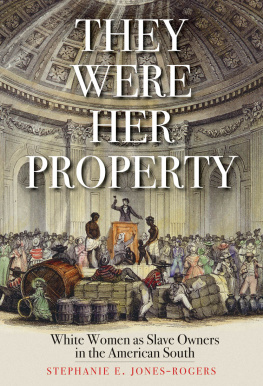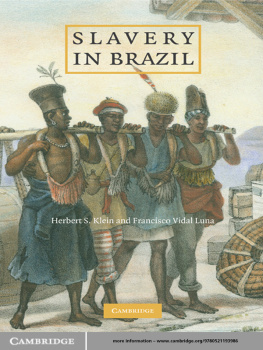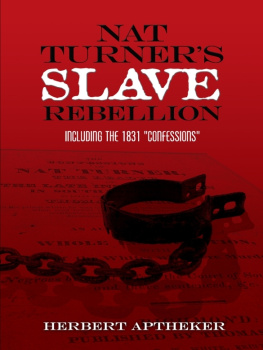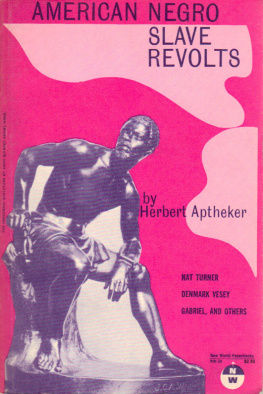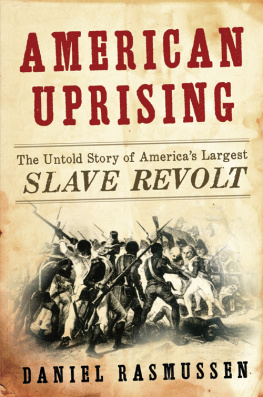
Copyright
Copyright 1966, 2006 by The Estate of Herbert Aptheker.
All rights reserved.
Bibliographical Note
This Dover edition, first published in 2006, is an unabridged republication of the work originally published by Humanities Press, Inc., New York, in 1966. A Preface to the Dover Edition has been added.
9780486137308
International Standard Book Number: 0-486-45272-7
Manufactured in the United States of America
Dover Publications, Inc., 31 East 2nd Street, Mineola, N.Y. 11501
Table of Contents
PREFACE TO THE DOVER EDITION
Herbert Aptheker wrote Nat Turners Rebellion as his Masters Thesis at Columbia University, and submitted it in February 1937. The only work on Turner prior to Apthekers study, titled The Southampton Insurrection, was written by William S. Drewry and published in 1900. It treated the insurrection with fear and contempt and sexualized Turners motives. While Aptheker was studying at Columbia, the most authoritative works on slavery to date had been written by Ulrich B. Phillips. These works, entitled American Negro Slavery (1918) and Life and Labor in the Old South (1929), both achieved critical acclaim. They exonerated the South of its peculiar institution, observing that Negroes were particularly and naturally fitted for slavery. While Phillips noted some cruelties on the part of masters or overseers, enslaved Africans had no names, no countries or places of origin, and no historical agency. Aptheker was part of a revisionist movement in the historical profession that owed its intellectual heart to African American scholars such as W. E. B. Du Bois, Carter G. Woodson, and Rayford W. Logan.
Writing against the grain of the established historical profession in American universities, Apthekers thesis was a prelude to his dissertation, American Negro Slave Revolts, first published by Columbia University Press in 1943. The Turner Cataclysm was a chapter in the dissertation. Aptheker first published his Rebellion in 1966 at the apex of the civil rights and black power movements and a year after the Watts Uprising. It was initially published as a hardcover book by Humanities Press with the imprint of the American Institute for Marxist Studies, which he directed, and later as a popular paperback edition by Grove Press.
Aptheker was involved in a swirl of controversy the following year with the publication of William Styrons novel, The Confessions of Nat Turner. The novel purported to be in Turners voice. One reviewer noted that Styron showed us the strange, mad mind of Nat Turner, and offers a passkey to the dark dungeon of his sexual imagination. Aptheker wrote a fierce critique of Styron in Political Affairs, the Communist Partys theoretical journal in October 1967. He was also deeply involved in encouraging and assisting in the publication of a response to Styron by African American intellectuals under the editorship of John Henrik Clarke, entitled The Second Crucifixion of Nat Turner, which was published in 1968. Outraged at Styrons appropriation of a black hero in the particular political context of the black power movement, contributors to the Crucifixion included Lerone Bennett, Jr., Dr. Alvin Poussaint, Vincent Harding, and Ernest Kaiser. When plans were announced for a Hollywood movie based on Styrons novel, the black community mobilized such opposition that no actor could be found who would agree to play the lead role of Nat Turner.
As the United States moves deeper into the twenty-first century, racism continues unabated albeit in ever new forms and patterns. Debates on immigration and racial profiling, the incarceration of shocking numbers of African Americans, especially young men, and the 750% increase in the incarceration of women since the 1970s, especially African American women, continues the kind of criminalization of a people so evident in the characterizations and debates surrounding Nat Turner. Perhaps then, in considering the reprinting of Herbert Apthekers work the historical record may yet again shed light on the present moment. He would, in any event, be very pleased.
Bettina Aptheker
University of California
Santa Cruz
FOREWORD
THIRTY YEARS AFTER
There is no book dealing with the revolt of slaves in Southampton County, Virginia, in August, 1831, led by Nat Turner, except that written by William S. Drewry and published more than sixty-five years ago. Of that work sufficient is said in the pages that follow; here it need but be commented that for the truth of the Turner event it would have been better if Drewry had never published.
Toward the close of the 19th century, the young Harvard student William Edward Burghardt Du Bois, was fascinated by the Turner event; encouraged by Professor Albert Bushnell Hart he spent much time studying it. His doctoral thesis, however, was on the suppression of the African slave trade, and Du Bois did not publish any study of Turner. He almost did, though, and therein lies a story.
In the first decade of the twentieth century, the Philadelphia publishing firm of George Jacobs & Co., launched the American Crisis Biography series, under the editorship of the historian, Ellis P. Oberholtzer; the idea of the series, explaining its title, was to produce biographical studies of personalities identified with particularly critical episodes or periods in American history. Du Bois reputation as a scholar already was well establishedin 1896 his Harvard Historical Studies Number I, and in 1899 his study of The Philadelphia Negro University of Pennsylvania Studies Number 14and in 1903 his masterpiece, The Souls of Black Folk had appeared.
Hence, Mr. Oberholtzer asked Dr. Du Bois if he would undertake for the Jacobs series a biography of Frederick Douglass who had died in 1895. Du Bois agreed, and a contract was signed. Word of this agreement, however, got out of the Jacobs office and reached the ears of Booker T. Washington at Tuskegee. Mr. Washington let it be known that he was not pleased with the choice of a biographer for the late Douglass and that a more worthy choice would beMr. Washington. This settled that question, and poor Mr. Oberholtzer wrote in evident embarrassment to Dr. Du Bois of the necessary switch in authors for the Douglass book; at the same time, he asked Du Bois to suggest his own choices for biographical treatment.
Dr. Du Bois, put out, but exercising his considerable powers of restraint, reminded the Jacobs firm of their contract, yielded to its decision on Douglass and then stated he wished to produce a volume on either of two subjects: Nat Turner or John Brown!
The Jacobs firm, faced with the problem of Du Bois as an authorhe had already launched the terribly radical Niagara Movementnow had to choose between a black insurrectionist or a white one. It chose, of course, the white man; thus did Du Bois John Brown appear (first in 1909) while Du Bois work on Turner never did get done.
In the heady New Deal days of the 30s, Professor Rayford W. Logan conceived of a Committee whose purpose it would be to erect a monument to the memory of Nat Turner; Dr. Du Bois told the young Logan that he doubted this could be accomplished, but wished him well. Du Bois was right.
At the same timeand also a child of the timesthe present writer, who already had seen a good deal of the South and whose main interests for several years had been devoted to U.S. history and especially to the subject of slavery, began a study of what was then conceived generally to be an altogether unique eventa slave insurrection in the United States.
The book now in the readers hand was written, then, thirty years ago, and accepted as a thesis for the masters degree at Columbia University in February, 1937. Professor Allan Nevinsthough perhaps bothered by an overly intense studentwas encouraging; particularly helpful at that time was the late Professor William L. Westermann, whose renown rested upon his mastery of ancient slavery but who was fascinated by comparative studies and who especially helped this beginner. For three decades this study has reposed on the shelves of the Columbia librarynot unread, I am happy to sayand now, at last, a publisher has decided to give it life.
Next page
